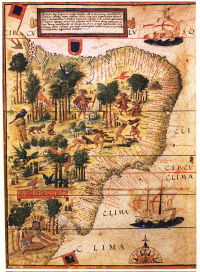Discovery of Brazil

Foi em 1500 que Pedro Álvares Cabral descobriu o Brasil, dando-lhe o nome de “ Terra de Vera Cruz”. Este navegador partiu de Lisboa a 9 de Março de 1500. Sob as ordens do Rei D. Manuel I. A sua armada era constituída por 13 navios, tinha um bom carregamento de armas e uma tripulação de cerca de 1500 homens e dirigia-se para a Índia.
A viagem decorreu de início sem grandes incidentes, contudo inexplicavelmente, perderam uma nau perto da Ilha de Cabo Verde. A 22 de Abril, 43 dias após ter saído de Portugal, Pedro Álvares Cabral chegava ao Brasil. Existem Historiadores que defendem a tese que o Brasil já era conhecido. Pelo que este descobrimento não foi por acaso. Mas antes fazia parte da chamada “política de sigilo” do Rei D. João II, que não revelava tudo o que sabia para os países concorrentes não lhe disputarem os territórios.
A primeira cerimónia que realizaram foi uma missa. Espetou-se uma cruz na praia, montou-se um altar, ergueu-se a bandeira da Ordem de Cristo e o padre deu início à cerimónia.
O Brasil forneceu muitos produtos a Portugal. No início o produto mais importante do Brasil foi a cana-de-açúcar. Posteriormente também se produziu o tabaco em grandes quantidades e no século XVII começaram a afluir grandes quantidades de Ouro. Hoje em dia o Brasil é um país simpático, que fala Português e tem muitos costumes portugueses.
Patrícia
Paula
Tiago Costa
Tiago Duarte

It was in 1500 that Pedro Álvares Cabral found a new land, Brazil, to which he gave the name of “Terra de Vera Cruz”. This navigator left from Lisbon, on the 9th of March of 1500. At the orders of the king Manuel I the army was constituted by 13 ships, it had a good shipment of armoury and a good crew of about 1500 men and it was headed to India.
The trip went as planned in the beginning, however, without a possible explanation, they lost a ship (nau) near the island of Cabo Verde. On April 22, 43 days after leaving Portugal, Pedro arrived at Brazil. There are historians who defend the thesis that Brazil was already known and that this discovery was not accidental and it was part of the “secrecy policy” instituted by the king D. João II, who didn’t reveal everything he knew so that the competitor countries wouldn’t fight for the same territories.
The first ceremony held was a mass. A cross was put on the beach, an altar held and a flag of the “Christ’s Order” raised and a priest took care of the ceremony.
Brazil provided a lot of products for Portugal. In the beginning the most important product was sugar cane. Later tobacco was also produced in large quantities and, on the XVII century, large quantities of gold were discovered. Nowaday’s Brazil is a nice country where Portuguese is the official language and a lot of Portuguese traditions are maintained.











